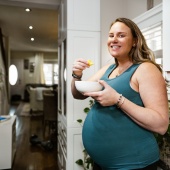Here we talk about what perinatal obsessive compulsive disorder (OCD) is, the symptoms and its treatments.
Having a baby brings many changes to a parent’s life and some of these changes can be stressful.
It‘s normal for any parent to worry about their baby’s wellbeing and to be more careful about avoiding risks during pregnancy and after the birth. But for some parents, these worries can trigger perinatal obsessive compulsive disorder (OCD) or other mental health issues. They can also worsen existing OCD symptoms to the point where they interfere with quality of life (RCPsych, 2018).
What is OCD?
OCD is a mental health disorder that affects people in different ways. It typically causes particular patterns of behaviour or thoughts, often characterised by obsessions and compulsions (NHS, 2019a). When parents experience OCD in pregnancy or in the first year following birth, it’s called perinatal OCD.
For people who already had OCD, around a third find that pregnancy and childbirth can make it worse. But for some, pregnancy and birth has no impact on their OCD or can even improve symptoms.
For OCD that starts after a baby is born, some people find it can come on very suddenly in the days or weeks after the birth (RCPsych, 2018). Other people find OCD starts more gradually (RCPsych, 2018).
In the general population, about 1% to 3% of people have OCD (NICE, 2018a). In pregnancy, the rate of OCD may be as high as 5%, and postnatally 9%, with rates of OCD similar in men and women (Walker et al, 2021).
It is common to experience OCD alongside other mental health conditions, such as depression, eating disorders and anxiety (Challacombe and Wroe, 2013; O’Hara and Wisner, 2014; Fairbrother et al, 2016).
What are the signs and symptoms of perinatal OCD?
Perinatal OCD can affect people in different ways but it tends to have three main parts:
- Obsessions – when unwelcome and often upsetting, persistent thoughts, images or urges, appear in the mind again and again. Examples include an intense fear that something is contaminated by germs or dirt, or having pictures repeatedly coming into your mind about accidentally or deliberately harming your baby (RCPsych, 2018).
- Intense feelings of anxiety, guilt or depression caused by these obsessive thoughts (Mind, 2020).
- Compulsions – repetitive activities undertaken to reduce the anxiety or feelings caused by the obsessions. Examples include: repeatedly checking a door is locked, repeating a specific phrase in your head or repeatedly checking how your body feels (Mind, 2020).
The compulsive behaviour temporarily relieves the anxiety, but the obsession and anxiety soon return, causing the cycle to start again.
When OCD occurs in the perinatal period, symptoms might be focused on the baby and parenting. In pregnancy, fears around accidentally harming the baby may lead to compulsions, such as excessive hand washing or restricting diet. After the baby is born, fears around deliberately harming the baby may lead to avoidance of particular tasks, or mental rituals to try to cancel out negative thoughts (Challacombe and Wroe, 2013).
Other symptoms of perinatal OCD include:
- an intense fear that something your baby uses, such a bottle or toy, is contaminated by germs
- having an image or a thought of harming your baby
- washing or sterilising your baby’s items repetitively/excessively
- repeatedly checking your baby throughout the night to ensure they are breathing
- repeatedly asking others to tell you that everything is alright with your baby or your parenting.
(RCPsych, 2018)
What causes OCD?
It is unclear exactly what causes OCD but there are some biological, personal experience and personality risk factors (Payne and Osborne, 2020).
Research shows there is a higher chance of developing perinatal OCD through:
- having a family member who has OCD
- having differences in the brain, such as areas of high activity or low levels of a chemical called serotonin
- life events, such as having been bullied, abused or neglected
- personality traits, such as being meticulous or having high personal standards. (NHS, 2019b)
OCD can affect anyone at any time of life but pregnancy or birth appears to trigger perinatal OCD in some people. A number of additional risk factors could make you more likely to develop perinatal OCD. Hormones may be an issue for some, while for other parents a traumatic event may play a part (Miller and Brock, 2017; Payne and Osborne, 2020).
Potential impact of perinatal OCD
Perinatal OCD affects different parents in different ways, which means the impact on day-to-day life and parenting will be unique. Some common impacts of perinatal OCD include:
- having less physical time or emotional space to spend with your baby or child
- impacts on the attachment and bond between parent and baby
- lower rates of breastfeeding
- impacts on the relationship with your partner, family and friends
- physical harm, such as sore skin from excessive cleaning.
(Sharma and Sommerdyk, 2015; Challacombe et al, 2016; Fairbrother et al, 2021; OCDUK, 2022)
Some parents worry that their symptoms of perinatal OCD mean they are a ‘bad’ parent. Some parents do not discuss their problems with healthcare professionals for fear of a negative perception of them as a parent, or fear that their baby might be taken into care (NICE, 2018b). It’s important to remember:
- Obsessions associated with perinatal OCD are not a reflection of personality. Parents almost invariably have no intention to act on the intrusive thoughts of OCD.
- Although parents with OCD may fear harming their baby, there are no recorded cases of people with OCD acting on their obsessional thoughts. Most parents can care for their baby and other children well despite their symptoms.
- In most cases, you will stay at home together and get better with support and treatment. Occasionally, a woman with severe perinatal OCD may need admission to hospital. In that case, a woman will usually be admitted to a specialist mother and baby unit with her baby.
(Lawrence et al, 2017; RCPsych, 2018; Mind, 2020)
Support and treatments for OCD
It’s important to remember that perinatal OCD is an illness and it is treatable. Someone with perinatal OCD does not choose to have obsessions and it’s not something that is anyone’s fault.
The help and treatment needed depends on how severe the perinatal OCD is. Some will benefit from self-help strategies, whereas people with more severe illness will need help from mental health services (RCPsych, 2018).
The best place to start is to talk to family and friends and your GP about how you are feeling. If your GP thinks you have perinatal OCD, they will refer you to a psychiatrist or another mental health professional for an assessment (Mind, 2020).
Treatments
The two main treatments for OCD are talking therapies and anti-depressant medications (NICE, 2005, 2018b). These can be used alone or in combination. Research suggests that both can be effective (Skapinakis et al, 2016).
- Medication – usually a type of antidepressant medication called selective serotonin reuptake inhibitors (SSRIs) that can help by altering the balance of chemicals in the brain (NICE, 2005).
- Psychological therapy – usually a special type of cognitive behavioural therapy (CBT) that helps to face fears and obsessive thoughts without 'putting them right' with compulsions. Other talking therapies include interpersonal therapy and mindfulness (NICE, 2005).
Some people with mild OCD find they can use self-help resources to develop their own coping strategies or use them while waiting for treatment or alongside treatment (Mind, 2020). See our article about perinatal mental health self-help for more information.
Support
Various charities offer support to people with OCD. The charity Maternal OCD offers specific support for perinatal OCD. Top UK is charity that helps people who have phobias, OCD and other related anxiety. Top UK has a network of self-help therapy groups.
OCD self-help resources are available from charities like OCD UK and OCD Action.
Therapy
If you want to explore private therapies, it is important that the person offering you care and treatment is appropriately qualified and insured. For help finding a qualified therapist with professional accreditation, you can click to see this information from Mind. It may be helpful to speak to your GP first about the type of private therapy you are considering.
Treatment for any mental health problem should always start with a clear assessment of your mental health to make sure the techniques the therapist would use will be helpful. With any type of therapy, it is important that you feel comfortable and safe with the therapist and with the therapeutic techniques they use. If you're not comfortable for any reason, you should consider moving therapists, which is possible even within the NHS.
This page was last reviewed in January 2022.
Further information
Our support line offers practical and emotional support with feeding your baby: 0300 330 0700.
We also offer antenatal courses which are a great way to find out more about birth, labour and life with a new baby.
Make friends with other parents-to-be and new parents in your local area for support and friendship by seeing what NCT activities are happening nearby.
The NHS has information on OCD as does the the charity Mind.
For tips on how to support your partner with OCD, see this information from the Royal College of Psychiatrists.
The experience of mental health symptoms can be overwhelming but help is available. So do speak to a trusted healthcare professional, such as a midwife, health visitor, or GP. If you feel at risk of harming yourself or others, call 999, attend an emergency department or call the Samaritans on 116 123.
Abramowitz J, Moore K, Carmin C, Wiegartz P, Purdon C. (2001) Acute onset of obsessive–compulsive disorder in males following childbirth. Psychosomatics. 42(5):429-431. Available at: https://pubmed.ncbi.nlm.nih.gov/11739911/ [Accessed 14th January 2022]
Challacombe FL, Salkovskis PM, Woolgar M, Wilkinson EL, Read J, Acheson R. (2016) Parenting and mother-infant interactions in the context of maternal postpartum obsessive-compulsive disorder: effects of obsessional symptoms and mood. Infant Behav Dev. 44:11-20. Available at: https://pubmed.ncbi.nlm.nih.gov/27259042/ [Accessed 14th January 2022]
Challacombe FL, Wroe AL. (2013) A hidden problem: consequences of the misdiagnosis of perinatal obsessive–compulsive disorder. Br J Gen Pract. 63(610):275-276. Available at: https://www.ncbi.nlm.nih.gov/pmc/articles/PMC3635574/ [Accessed 14th January 2022]
Fairbrother N, Challacombe FL, Truong TT. (2021) Perinatal and Postpartum Obsessive-Compulsive Disorder. In: Complexities in Obsessive Compulsive and Related Disorders: Advances in Conceptualization and Treatment. Oxford University Press.
Fairbrother N, Janssen P, Antony MM, Tucker E, Young AH. (2016) Perinatal anxiety disorder prevalence and incidence. J Affect Disord. 200:148-155. Available at: https://pubmed.ncbi.nlm.nih.gov/27131505/ [Accessed 14th January 2022]
Lawrence PJ, Craske MG, Kempton C, Stewart A, Stein A. (2017) Intrusive thoughts and images of intentional harm to infants in the context of maternal postnatal depression, anxiety, and OCD. Br J Gen Pract. 67(661):376-377. Available at: https://www.ncbi.nlm.nih.gov/pmc/articles/PMC5519121/ [Accessed 14th January 2022]
Miller ML, Brock RL. (2017) The effect of trauma on the severity of obsessive-compulsive spectrum symptoms: a meta-analysis. J Anxiety Disord. 47:29-44. Available at: https://pubmed.ncbi.nlm.nih.gov/28242410/ [Accessed 14th January 2022]
Mind. (2020) What is perinatal OCD? Available at: https://www.mind.org.uk/information-support/types-of-mental-health-prob… [Accessed 14th January 2022]
NHS. (2019a) Symptoms - obsessive compulsive disorder (OCD). Available at: https://www.nhs.uk/mental-health/conditions/obsessive-compulsive-disord… [Accessed 14th January 2022]
NHS. (2019b) Overview - obsessive compulsive disorder (OCD). Available at: https://www.nhs.uk/mental-health/conditions/obsessive-compulsive-disord… [Accessed 14th January 2020]
NICE. (2005) Obsessive-compulsive disorder and body dysmorphic disorder: treatment. Available at: https://www.nice.org.uk/guidance/cg31 [Accessed 14th January 2022].
NICE. (2018a) Obsessive-compulsive disorder: how common is it? Available at: https://cks.nice.org.uk/topics/obsessive-compulsive-disorder/background… [Accessed 14th January 2022]
NICE. (2018b) Antenatal and postnatal mental health: clinical management and service guidance. CG192. Available at: http://www.nice.org.uk/guidance/cg192/evidence [Accessed 26th January 2022]
OCDUK. (2022) The impact of OCD. Available at: https://www.ocduk.org/ocd/impact-of-ocd/ [Accessed 14th January 2022]
O'Hara MW, Wisner KL. (2014) Perinatal mental illness: definition, description and aetiology. Best Pract Res Clin Obstet Gynaecol. 28(1):3-12. Available at: https://www.ncbi.nlm.nih.gov/pmc/articles/PMC7077785/ [Accessed 14th January 2022]
Payne JL, Osborne LM. (2020) Biomarkers of Postpartum Psychiatric Disorders. Academic Press, an imprint of Elsevier.
RCPsych. (2018) Perinatal obsessive compulsive disorder. Available from: https://www.rcpsych.ac.uk/mental-health/problems-disorders/perinatal-ocd [Accessed 26th January 2022]
Sharma V, Sommerdyk C. (2015) Obsessive–compulsive disorder in the postpartum period: diagnosis, differential diagnosis and management. Womens Health (Lond). 11(4):543-552. Available at: https://journals.sagepub.com/doi/10.2217/WHE.15.20 [Accessed 14th January 2022]
Singley DB, Edwards LM. (2015) Men’s perinatal mental health in the transition to fatherhood. Prof Psychol Res Pr. 46(5):309. Available at: https://psycnet.apa.org/record/2015-27504-001 [Accessed 14th January 2022]
Skapinakis P, Caldwell D, Hollingworth W, Bryden P, Fineberg N, Salkovskis P, et al. (2016) A systematic review of the clinical effectiveness and cost-effectiveness of pharmacological and psychological interventions for the management of obsessive compulsive disorder in children/adolescents and adults. Health Technol Assess. 20(43):1-392. Available from: https://www.ncbi.nlm.nih.gov/books/NBK367936/ [Accessed 14th January 2022]
Walker R, Blackie M, Nedeljkovic M. (2021) Fathers’ experience of perinatal obsessive–compulsive symptoms: a systematic literature review. Clin Child Fam Psychol Rev. 24(3):529-541. Available at: https://pubmed.ncbi.nlm.nih.gov/34046813/ [Accessed 14th January 2022]






